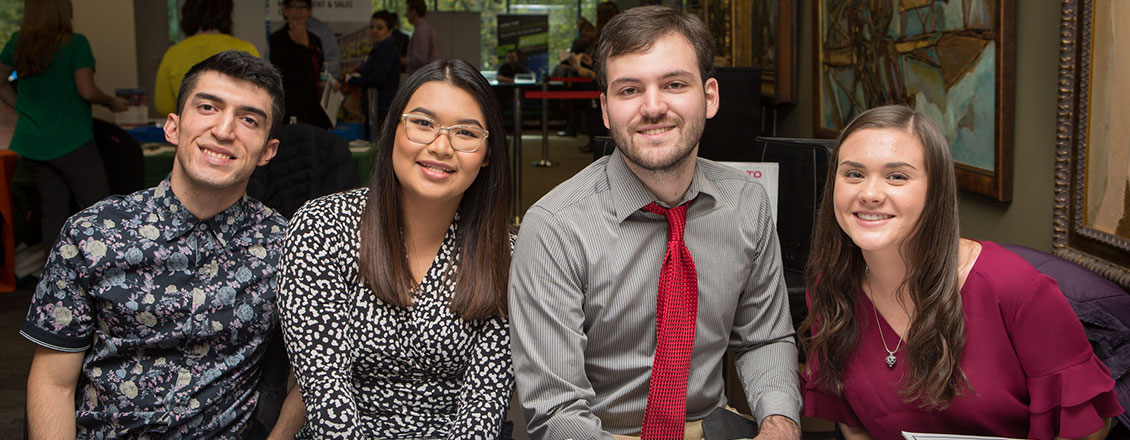
Graduate School
Planning to Attend Graduate School
Career Advisers can provide guidance regarding the process, necessary documents, and timelines for applying to graduate school.
Check out the range of Graduate Programs ESU Graduate Studies has to offer!
What to Include in your Personal Statement
Most programs require a personal statement or statement of purpose. This is a narrative about who you are and why you’re interested in graduate school. Use the following guidelines to help you prepare your statement.
- 1. Read the directions.
-
Carefully follow the instructions for the statements. Some are very structured and others are open-ended. It is important to follow all directions and to follow page-length guidelines.
- 2. Brainstorm.
-
Begin by brainstorming ideas and reflecting on your experiences. Consider how your experiences have prepared you for graduate school, and what you hope to gain. Create an outline at this point to highlight some of your key thoughts.
- 3. Story.
-
Great statements read as stories, capturing the reader, providing examples, stating clearly the intent and purpose. The committee will have your transcript and your resume; you don’t need to detail your complete biography in your statement. Provide a few concrete examples.
- 4. Customize.
-
Be sure to include why are you interested in the school you are applying to. What is it about the program, faculty, classes or philosophy that you think would make you a good fit.
- 5. Examples.
-
What makes a good personal statement? There is no one-size-fits-all approach. Instead, look at a variety of samples to explore different ways to write an effective statement.
- 6. Feedback, Edit, Refine.
-
Seek feedback from multiple sources about your essay. Professors, advisers, friends, and family can all provide good insight into your essay. Visit The Writing Center for feedback on grammar and sentence structure. Schedule an appointment at the Career Development with a career adviser for individualized feedback on your essay.
How to Ask for a Letter of Recommendation
Graduate programs typically require two to four letters of recommendation. Be sure to follow the program’s instructions for submitting letters of recommendation. Many schools have an additional form that goes along with the letter, and they may prefer the letters be sent directly to the school.
- Ask for a Recommendation
-
Decide whom you’d like to ask to write a recommendation letter on your behalf. Select someone who knows you well, and who knows about your academic abilities and interests.
A good rule of thumb is to look for someone who knows your academic work (a professor, adviser, current graduate student, or someone in your field of study) and someone who knows you professionally (a supervisor, boss, co-worker, or someone you volunteer for). Seeking out friends, family or political figures is generally discouraged and should only be used as a last resort for a third letter.
Set up a time to meet with your recommender, if possible, so you can ask them in person to write a letter for you. This is particularly helpful for faculty and staff, so they have a chance to speak with you and discuss your graduate plans. Think about why you are interested in graduate school, how well the recommender knows you and what you’d like them to emphasize in their letter. If you are unsure how well the person knows you, or you feel they may not write you a strong letter, you may want to consider finding someone else.
- Follow-up
-
- Send a follow-up email to your recommender with all the necessary details. This is an important step, as you can help guide what you’d like emphasized in your letter of recommendation. Include in your email:
- Details on the programs and due dates (give them at least one month’s notice to write the letter)
- What you would like them to focus on (academics, work ethic, interest)
- Unofficial transcript (reminds professors when you took their class, and how you did)
- Current resume
- A draft of your statement of purpose
- Recommendation form
- Instructions for submitting the letter
- Get the Best Recommendation
-
The best recommendations come from people who know you. It is best to get involved early and make yourself known. Find ways to get involved in class, meet with a professor during office hours, and volunteer to take on projects or research. Looking for activities and departments you are interested in, even student groups provides a great way to get involved and meet the staff.
- Thank You Notes
-
Send a follow-up thank you note to those writing letters for you. This is a great way to thank people for taking the time to write a letter. Send the note a few weeks before the due date to remind them to write the letter!
Contact Us
Contact Information
- Campus Address
- University Center, 2nd Floor
- Phone:
- (570) 422-3219
- Fax:
- (570) 422-3609 (Fax)
- Title of Department Leader
- Director Career Development
- Name
- Breanna Betarie
- E:
- bbetarie@esu.edu
- Phone:
- (570) 422-3045



